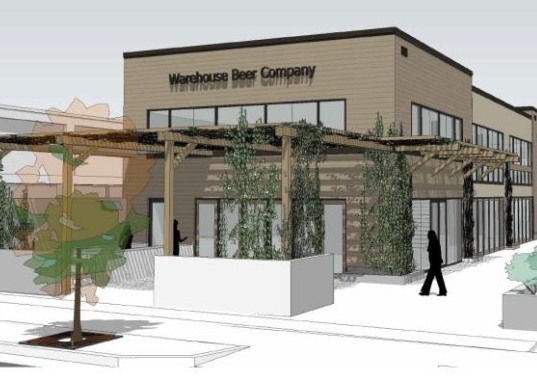Despite recent pronouncements of an impending acquisition, discount retailer Family Dollar continued to expand its presence in the Raleigh area over the month of July, receiving permits for new locations in both the southeast and southwest portions of the city.
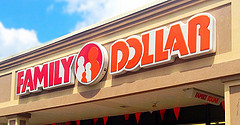
Photo by Flickr User Mike Mozart
Family Dollar
Although rival retailer Dollar Tree announced in late July its plans to buy out the Family Dollar chain, more recent reports indicate that Dollar General is considering its own bid for the 8,100-store chain.
While dedicated bargain hunters would likely prefer Dollar Tree to come out on top – of the three chains, it is the only “true” dollar store – the end result of more of these variant of variety stores dotting the lower-income sections of the city will be the same either way. (For the fortunate few who never occasioned to realize there was more than one chain of stores with the word dollar in the title, a “true” dollar store is one that sells its wares for $1 or less.)
Counting the two new locations – on Rock Quarry and Lake Wheeler Road – there will soon be a total of 10 Family Dollars within city limits. According to their respective web sites, there are currently nine Dollar Trees and five Dollar Generals in Raleigh.
These numbers are likely to continue growing over the coming years. A white paper put out in late 2011 by real-estate services firm Colliers International noted that dollar stores have been a rare spot of growth in a down economy, as they cater to an increasingly price-conscious populous.
The piece makes for an interesting read, and trying to condense too much of it here would do its authors a disservice. One point it makes, however, is that these dollar stores are likely growing at the expense of discount superstores such as Wal-Mart, which has recently attempted to compete through its smaller “Wal-Mart Neighborhood Market” branded outlets.
So what does this mean? Will Wal-Mart, blamed for the destruction of small-town America by forcing out smaller, locally owned businesses, eventually fall to these smaller, nimbler dollar stores? Will these be the Redbox to Wal-Mart’s Blockbuster?
Or will 3-D printer kiosks eventually begin surfacing outside the nation’s grocery stores and pharmacies, offering consumers a wide range of cheap, disposable goods and sundries, rendering the dollar stores yet another relic of a soon-forgotten past?
Only time will tell. But one fact remains – nothing will ever replace the glory that is $5 Below.
Happening Now-Ish
The Triangle Town Center continues a recent round of renovations last week, as permits for two hobbyist stores were recently issued. The existing Sportsmania, a sports memorabilia shop, and the new RC World, which will likely cater to fans of remote-controlled devices like cars and helicopters, will both be receiving about $8,00 worth of work. Or roughly, the cost of one decent baseball card and a mid-range RC helicopter.
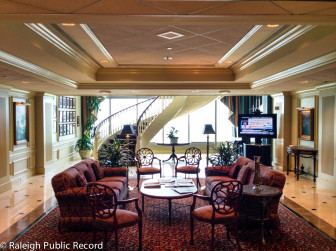
James Borden / Raleigh Public Record
Raleigh\’s Cardinal Club is in the midst of an extensive renovation project
Speaking of ongoing renovations, Raleigh’s illustrious Cardinal Club – located on the top floor of the Wells Fargo building on Fayetteville Street – recently received permits for the continuing phases of an expensive project that will see the space merge with the Capital City Club. Both have seen declining memberships in recent years, although money has apparently not yet become too tight for the owners – the cost for the first phase was about $1,375,000, and the permits issued last week totaled about $372,000.
Glenwood Avenue will soon be home to yet another bar – the Beer Garden – which received permits totaling nearly $2 million dollars last week that will allow its owners to renovate and add onto an existing property. The turnaround time for this project – from planning commission approval to permits issued – was surprisingly quick, and perhaps indicative of the Oak City’s growing love for beer.
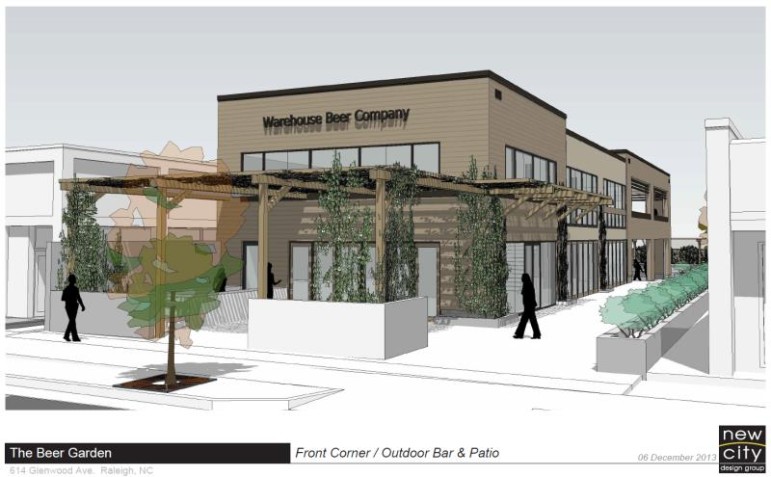
A rendering of the beer garden to be built at 614 Glenwood by the owners of Hibernian and other downtown venues.
Although Raleigh is already home to a variety of community gardens, this will be its first Beer Garden. Whether it will prove to be as sustainable and popular as, say, Raleigh City Farm, remains to be seen, although spending a full day at either will likely result in dehydration.
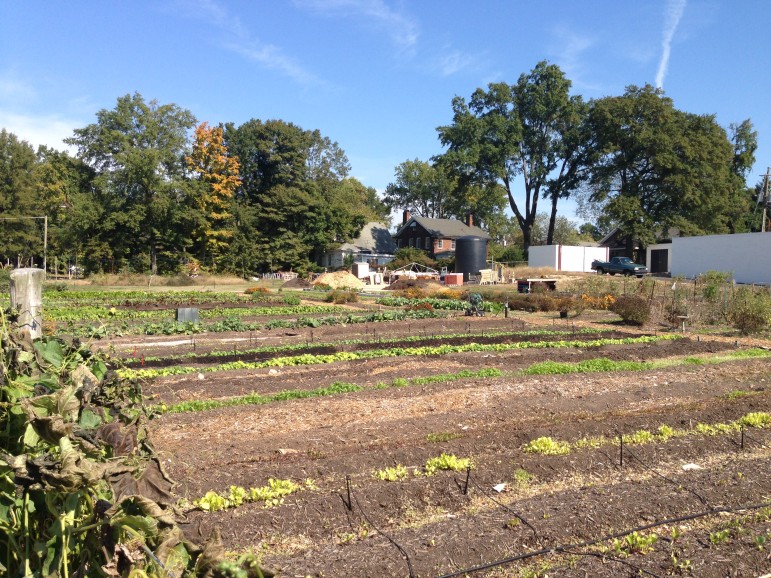
James Borden / Raleigh Public Record
The early days of Raleigh City Farm
Beer Garden wasn’t the only booze-friendly project to receive permits last week, as the Architect Bar and Social House – yes, it really calls itself that – on Hargett Street will soon be undergoing $12,00 in renovations for a new “wet-bar bookcase.” As cool as it might sound, this concept probably won’t entail hollowing out a bunch of books to serve liquor out of – say, James Joyce for top-shelf brands and James Patterson for the rotgut stuff – although it’s something the owners should certainly consider.
Coming Soon
Aside from approving a bunch of boring text changes to Raleigh’s Unified Development Ordinance, the only real planning action at City Council this week came in the form of a public hearing for some new retail in the Crabtree Mall area.
Zoning case Z-8-14, which Planning Commission members recommended for approval back in June, would convert the first floor of an office building on Century Drive into retail space.
The only thing that caught Mayor McFarlane off-guard more than the new beard sported by Jason Barron, the lawyer representing the applicant for the case who said he “went into the wild a bit” during a recent vacation in Maine, was Barron’s claim that the proposal was “trip-neutral” – that is, it wouldn’t create any additional traffic in the area.
Barron didn’t have a concrete explanation for the lack of increased traffic, although he attributed it largely to the fact that existing offices would be replaced with retail that would primarily cater to office workers on the other stories of the building. McFarlane, who said she’s “generally not a fan” of adding more retail to the Crabtree area, said this should be OK.
Councilors then requested that some conditions be added to the proposal regarding tree protection, something Barron said he didn’t have the authority to do. The hearing will remain open until these conditions are reviewed by the applicant.
By The Numbers
To paraphrase The Wire, there’s nothing more dangerous than a reporter with a calculator. Except perhaps a reporter who knows how to use said calculator. Which is not this reporter.
In this month’s edition of By The Numbers, we take a quick look at the number of permits issued for residential and non-residential construction and the number of real-estate transaction sales and compare them to numbers from the past five years.
In July of 2014, there were a total of 541 permits issued for $128,106,048 worth of work. The smallest job was a $25 bathroom renovation at someone’s townhome – a new set of hand towels, maybe? while the most expensive was the new $14,185,588 Building F library project at Wake Tech.
These numbers represent a significant increase over this month of July from the past five years, which saw an average of 471 permits issued for a total cost of around $62 million. Significantly, the average cost of each permit for the past five years in July hovered between $105,000 and $146,000; in 2014, the average cost per permit was $236,000.
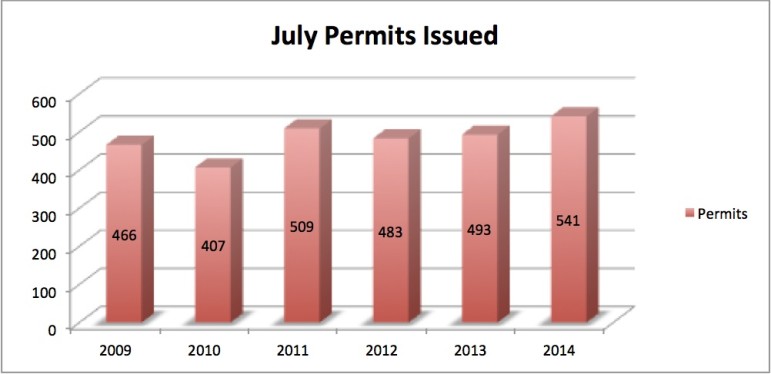
Residential and Nonresidential Building Permits
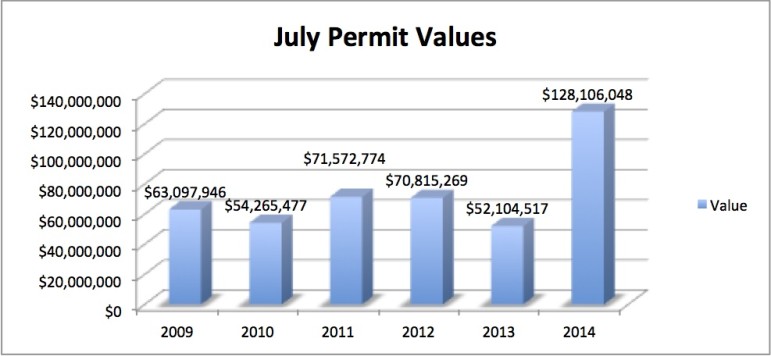
Residential and Nonresidential Building Permit Values
There were a correspondingly high number of real estate transactions for July of 2014 in the city of Raleigh as well, and while both the total number of transactions and the corresponding value were higher than the five-year average, neither was a record high on its own.
There were 1,141 residential and non-residential real estate sales were recorded for the month, with a total cost of $315,916,700. The five-year average was 790 sales for a total of $234,712,545. 2013 saw eight more transactions, although the total value was slightly less at $273,766,000. 2011 saw the highest value per transaction at $524,597; nearly double 2014’s $276,877.
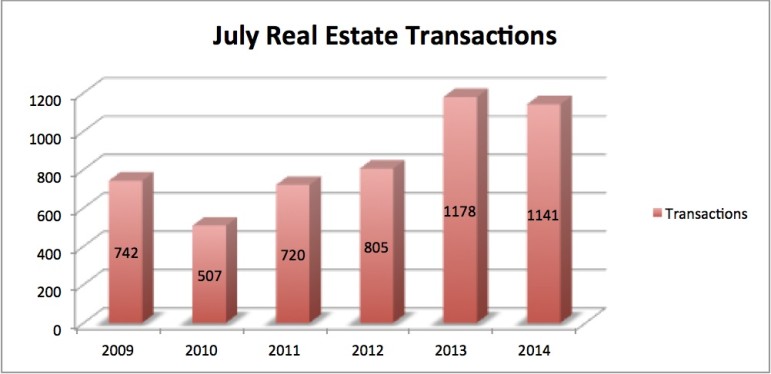
Residential and Nonresidential Land Sales
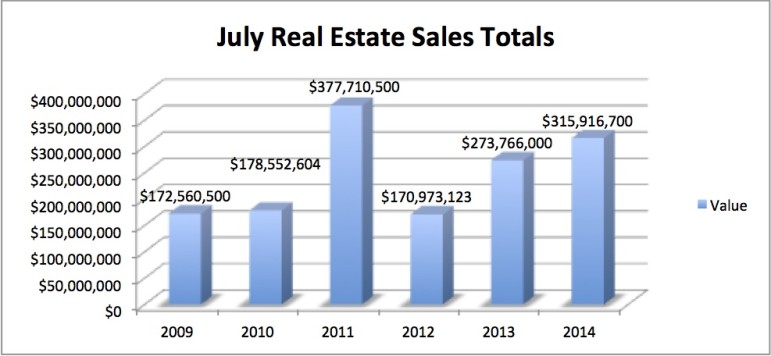
Residential and Nonresidential Real Estate Sale Values
